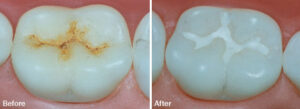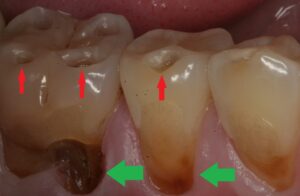Dental decay or Cavities, also known as tooth decay or dental caries, is a common oral health issue that occurs when the enamel of the teeth is damaged by acids produced by bacteria. Here’s a brief overview:
Bacteria and Plaque Formation:
The mouth naturally contains bacteria, and when these bacteria interact with sugars and carbohydrates from the food you consume, they produce acids.
The acids, along with food debris and bacteria, can form a sticky film called dental plaque on the teeth.
Enamel Erosion:
Plaque contains acids that can erode the enamel, which is the hard, outer layer of the tooth.
Enamel erosion weakens the tooth structure and makes it more susceptible to decay.
Cavity Formation:
Over time, if the process continues, the enamel breakdown can lead to the formation of cavities (holes) in the teeth.
If left untreated, the decay can progress to affect deeper layers of the tooth, including the dentin and pulp.
Symptoms:
In the early stages, dental decay may not cause noticeable symptoms.
As it progresses, symptoms may include tooth sensitivity, pain, and visible holes or pits in the affected teeth.
Prevention:
- Good oral hygiene practices, including regular brushing and flossing, help remove plaque and prevent the buildup of bacteria.
- Limiting the intake of sugary and acidic foods can reduce the risk of decay.
- Dental check-ups and professional cleanings are crucial for early detection and prevention.
Treatment:
- Treatment options depend on the severity of the decay. Early-stage decay may be managed with fluoride treatments or dental sealants.
- Advanced decay may require dental fillings, crowns, or in severe cases, root canal therapy.
Fluoride:
- Fluoride, found in toothpaste and sometimes in drinking water, helps strengthen enamel and can prevent decay.
- It’s important to address dental decay promptly to prevent further damage and complications. Regular dental check-ups are key to identifying and addressing dental issues early on. Maintaining good oral hygiene and making healthy dietary choices are crucial for preventing dental decay.





